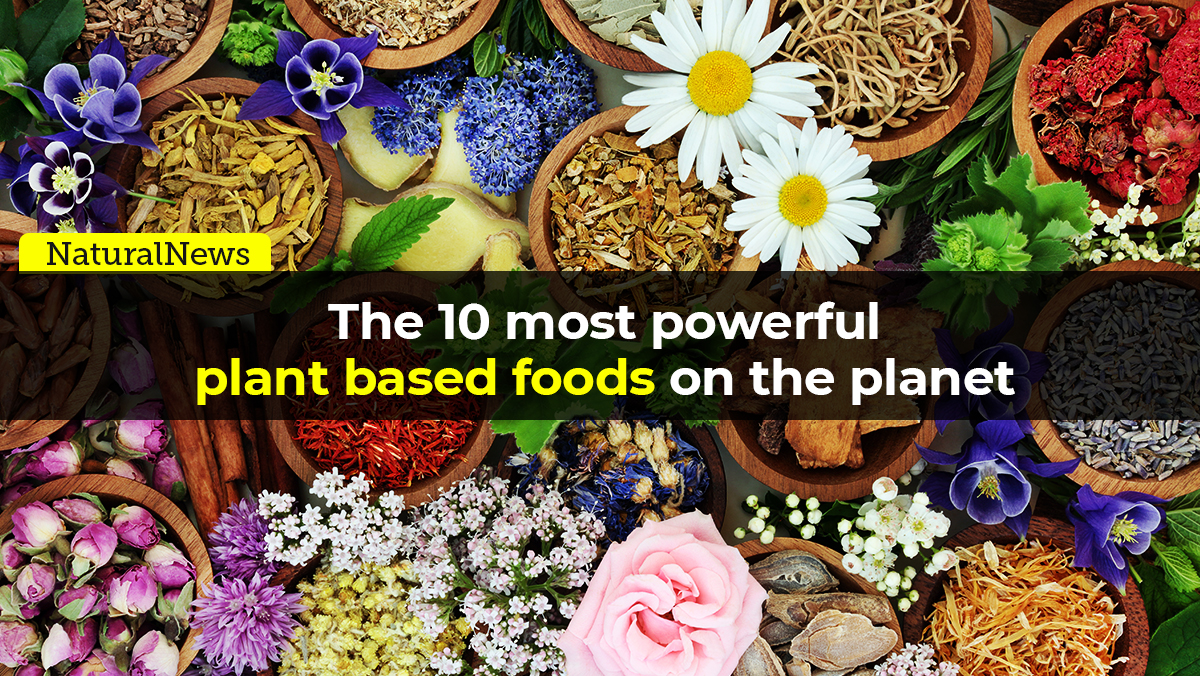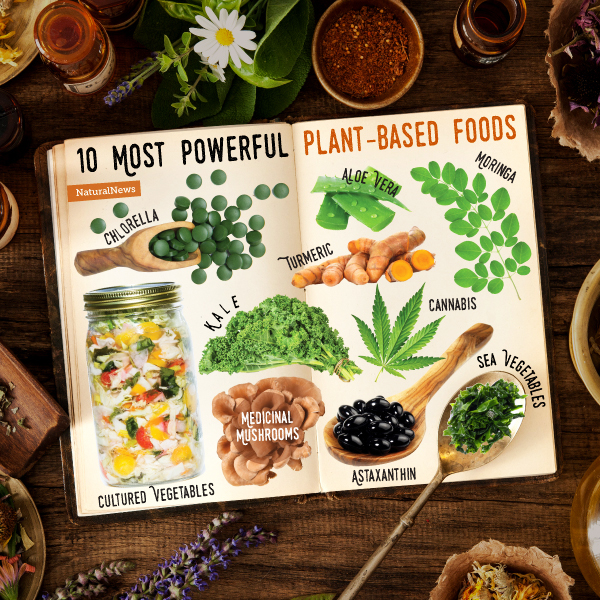From the Health Ranger Store: The 10 most powerful plant-based foods on the planet
05/02/2018 / By Derek Henry

The majority of people are living in a food desert, with very little unpolluted and nourishing food on the horizon. Sure, there is the odd oasis where you can pick up some fresh, organic, and nutrient dense food, but for many people these spots are far and few in between. Fortunately, organic food delivery services, food growing systems, and online shopping has allowed people to access food they normally would never get (or even see), which has dramatically changed the landscape for those wanting to live a true healthy lifestyle anchored in nutrition.
Now, if you want to accelerate your well-being by flooding your body with some of the most powerful foods on the planet, this is an excellent list to start with that will help shape your health goals in a fraction of the time it takes most people. As someone who used many of these foods to create my one-in-a-million health story, I’m well aware of how well they work when sourced appropriately.
Now, let’s dig in and see how ten of the most powerful foods on the planet can change your life, for good!
Chlorella
A single-celled green algae, chlorella has quickly become one of the most powerful foods that have been cultivated on the planet. It’s rich in highly digestible protein (58 percent of weight), chlorophyll, iron, zinc, vitamin A, C, E, and K, beta carotene, lutein, polysaccharides, and essential fatty acids including gamma linolenic acid (GLA). It also contains the entire vitamin B-complex, is one of the few whole food sources of vitamin D, and contains magnesium, phosphorus, calcium, and potassium.
When you take this powerful superfood, you can expect to support your digestive system, immune system, liver, energy production, muscle and joints, tissues, and heart health. For a clean source (many are contaminated), choose the Health Ranger’s Clean Chlorella.
Turmeric
You don’t get called the king or queen of spice if your benefits don’t back it up, and this brightly colored rhizome has held true to it’s lofty moniker. The benefits of turmeric mostly come from it’s active ingredient, curcumin, as well as it’s high antioxidant value. It is also a good source of vitamin B1, B2, B3, B6, C, E, and K, as well as the minerals manganese, iron, potassium, magnesium, phosphorus, zinc, copper, and calcium.
When you use turmeric properly (with an oil or fat), you can expect support for your immune system, digestive system, liver, skin, joints, muscles, brain, and heart. Use it liberally in food, and to increase your uptake daily (and your results), consider the Health Ranger’s Turmeric Gold.
Aloe vera
Affectionately known as the “lily of the desert,” the “plant of immortality,” and the “medicine plant,” aloe vera has a lofty profile with even more incredible benefits when taken internally. Loaded with 20 minerals, 12 vitamins, 18 amino acids, and 200 active plant compounds, it truly is a gift to our health.
Aloe vera is perhaps best known for external application on damaged skin, but as mentioned earlier it is a phenom when used inside the body as well. Some significant areas it supports includes digestion, immunity, skin health, blood sugar, heart health, and oral health. Be careful as many brands have synthetic preservatives such as sodium benzoate, which lowers the overall health benefits. For a clean, potent application with more versatility, try the Health Ranger’s Freeze Dried Aloe Vera Extract.
Cultured vegetables
A trend with serious momentum, cultured (or often referred to as “fermented”) foods are hitting the grocery store shelves and being prepared in people’s homes at a pace probably never seen before. This is likely due to the increased awareness of probiotics, in which cultured vegetables boast plenty and are arguably the richest source of all. In fact, in scientific testing a six ounce serving of sauerkraut boasted over 10 trillion bacteria!
Of course, cultured vegetables are not a one trick pony. They are also rich in enzymes, antioxidants, fiber, and indole-3-carbinol, as well as vitamins B1, B6, and B9, and vitamins C and K. If you need a dose of minerals, it can provide that too with manganese, calcium, potassium, magnesium, phosphorus, and iron topping the list.
Make sure to get raw (unpasteurized) cultured vegetables, or simply make them at home easily with this homemade sauerkraut recipe.
Kale
Perhaps the poster child of the health movement, kale is a member of the Brassica family and is perhaps one of the most nutritious vegetables in the world, passing even broccoli in the nutrition department. Kale is rich in vitamins K, A, and C and is an excellent source of iron and calcium (take that, dairy industry). It also contains magnesium, phosphorus, potassium, manganese, copper, zinc, thiamin, niacin, and pantothenic acid, and is a significant source of antioxidants and fiber.
Kale can be easily worked into a salad, smoothie, juice, or by making one of the most irresistible snack foods, kale chips. Try this Spicy Lime Kale Chip recipe and you’ll know what I mean by the perfect salty and crispy snack.
Moringa
Also known as the “miracle tree,” moringa is one of the newly unveiled superfoods on the block, and is causing quite a stir in the health community. It rivals many of the others nutritionally, with a great range and amount of amino acids, vitamins, and minerals. Some of these specific nutrients include vitamin A, B1, B2, B3, B6, folate, and vitamin C. Mineral wise, you can add calcium, potassium, iron, magnesium, phosphorus, and zinc. Combine this with an impressive antioxidant profile and you have a superfood brimming with possibilities for your health.
Moringa helps support the liver, kidneys, digestive system, skin, brain, eyes, bones, heart, and immune system.
Medicinal mushrooms
Medicinal mushrooms (reishi, chaga, maitake, shiitake, lion’s mane, etc.) are some of the oldest known adaptogenic herbs and have been used in Eastern countries for thousands of years, but are still relatively obscure in North America. This is unfortunate for those who have not chosen to use them as they are some of the most dynamic healing plants on the planet.
Although not particularly high in any one nutrient, they are a good source of B-vitamins, and are rich in potassium, niacin, calcium, selenium, magnesium, copper, and phosphorus. More impressively, they are an exceptional source of antioxidants, and more specifically, beta-glucans, polysaccharides, and triterpenes. When consuming medicinal mushrooms, you can expect support for the immune system, digestive system, cardiovascular system, liver, and adrenals.
Many medicinal mushrooms are polluted so ensure you get a clean source like the Health Ranger’s Reishi Mushroom Capsules, where you can enjoy one of the more revered varieties. You can also enjoy medicinal mushrooms as a tea, like this Coconut Chaga Latte.
Astaxanthin
Also known as the “King of Carotenoids,” astaxanthin is a deep red colored phytonutrient synthesized by microalgae. When harvested and concentrated into a liquid capsule, it becomes the most powerful antioxidant in the world. In fact, many of the most powerful antioxidants pale in comparsion, with alpha lipoic acid (ALA) and CoQ10 tested to be 75 and 800 times weaker, respectively.
Astaxanthin provides exceptional support for muscle, joint, tendon, and bone health; healthy eye function, skin health, cardiovascular health, exercise recovery, endurance, and age-related decline in cognitive and psychomotor function.
For a potent and natural astaxanthin, get the Health Ranger’s Hawaiian Astaxanthin.
Cannabis
There may be no plant as rife with popularity as cannabis right now. Even though it is one of the oldest domesticated crops known to man, it’s medicinal properties were not fully appreciated by mankind until the last few years. Although many think cannabis is strictly marijuana and used for smoking and getting high, it is far more than that and could revolutionize many industries.
Depending if you smoke it, use CBD oil, or eat the hemp seeds, the health benefits can vary. Smoking it can offer joint, muscle, and neuroprotective support, while CBD oil is often used for exceptional immune system support. If you choose to eat hemp seeds, you can get 20 amino acids, essential fatty acids, vitamin E, manganese, magnesium, phosphorus, calcium, iron, zinc, antioxidants, and fiber.
For a powerful source of hemp, try the Health Ranger’s Organic Hemp Seed Oil.
Sea vegetables
We’ve all been reminded to eat our vegetables, but most often this was referring to land vegetables. There are several good reasons to include sea vegetables like kelp, nori, and kombu into this reminder, as the nutritional and health benefits are very comprehensive.
Nutritionally, sea vegetables are one of the strongest sources of naturally occurring iodine. They also contain many other minerals including manganese, magnesium, copper, calcium, phosphorus, iron, potassium, selenium, molybdenum, and vanadium. As for vitamins, you can expect to get vitamin A, B1, B2, B3, B5, B6, C, D, E, and K in sea vegetables. They are also a good source of protein, fiber, antioxidants, and chlorophyll.
You can use seaweed in soups, noodle dishes, sushi, and even enjoy them as a salty snack using this nori chip recipe.
So there you have it. Arguably the ten most potent plant-based foods on the planet that are well documented to have numerous health benefits. Taken consistently, they just may be the best health insurance money can buy, so I suggest heavily investing in the many returns they can bring.
The ROI is well worth it.

For more on the healing powers of superfoods, visit SuperFood.news.
Sources include:
Submit a correction >>
Tagged Under:
This article may contain statements that reflect the opinion of the author
RECENT NEWS & ARTICLES
COPYRIGHT © 2017 SUPER FOODS NEWS





















